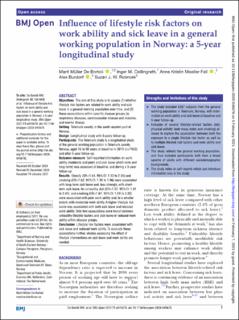| dc.contributor.author | Müller De Bortoli, Marit | |
| dc.contributor.author | Oellingrath, Inger Margaret | |
| dc.contributor.author | Fell, Anne Kristin Møller | |
| dc.contributor.author | Burdorf, Alex | |
| dc.contributor.author | Robroek, Suzan | |
| dc.date.accessioned | 2021-02-23T13:23:34Z | |
| dc.date.available | 2021-02-23T13:23:34Z | |
| dc.date.created | 2021-02-08T09:56:32Z | |
| dc.date.issued | 2021 | |
| dc.identifier.citation | De Bortoli, M. M., Oellingrath, I. M., Fell, A. K. M., Burdorf, A. & Robroek, S. J. W. (2021). Influence of lifestyle risk factors on work ability and sick leave in a general working population in Norway: a 5-year longitudinal study. BMJ Open, 11(2), e045678. | en_US |
| dc.identifier.issn | 2044-6055 | |
| dc.identifier.uri | https://hdl.handle.net/11250/2729868 | |
| dc.description.abstract | Objectives: The aim of this study is to assess (1) whether lifestyle risk factors are related to work ability and sick leave in a general working population over time, and (2) these associations within specific disease groups (ie, respiratory diseases, cardiovascular disease and diabetes, and mental illness).
Setting: Telemark county, in the south-eastern part of Norway.
Design: Longitudinal study with 5 years follow-up.
Participants: The Telemark study is a longitudinal study of the general working population in Telemark county, Norway, aged 16 to 50 years at baseline in 2013 (n=7952) and after 5-year follow-up.
Outcome measure: Self-reported information on work ability (moderate and poor) and sick leave (short-term and long-term) was assessed at baseline, and during a 5-year follow-up.
Results: Obesity (OR=1.64, 95% CI: 1.32 to 2.05) and smoking (OR=1.62, 95% CI: 1.35 to 1.96) were associated with long-term sick leave and, less strongly, with short-term sick leave. An unhealthy diet (OR=1.57, 95% CI: 1.01 to 2.43), and smoking (OR=1.67, 95% CI: 1.24 to 2.25) were associated with poor work ability and, to a smaller extent, with moderate work ability. A higher lifestyle risk score was associated with both sick leave and reduced work ability. Only few associations were found between unhealthy lifestyle factors and sick leave or reduced work ability within disease groups.
Conclusion: Lifestyle risk factors were associated with sick leave and reduced work ability. To evaluate these associations further, studies assessing the effect of lifestyle interventions on sick leave and work ability are needed. | en_US |
| dc.language.iso | eng | en_US |
| dc.rights | Navngivelse-Ikkekommersiell 4.0 Internasjonal | * |
| dc.rights.uri | http://creativecommons.org/licenses/by-nc/4.0/deed.no | * |
| dc.title | Influence of lifestyle risk factors on work ability and sick leave in a general working population in Norway: a 5-year longitudinal study | en_US |
| dc.type | Peer reviewed | en_US |
| dc.type | Journal article | en_US |
| dc.description.version | publishedVersion | en_US |
| dc.rights.holder | © Author(s) (or their employer(s)) 2021. | en_US |
| dc.source.volume | 11 | en_US |
| dc.source.journal | BMJ Open | en_US |
| dc.source.issue | 2 | en_US |
| dc.identifier.doi | https://doi.org/10.1136/bmjopen-2020-045678 | |
| dc.identifier.cristin | 1887522 | |
| dc.source.articlenumber | e045678. | en_US |
| cristin.ispublished | true | |
| cristin.fulltext | original | |
| cristin.qualitycode | 1 | |

